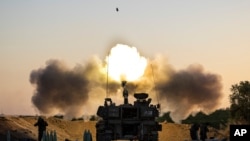The U.N. General Assembly will convene an urgent session Thursday requested by the Organization of Islamic Cooperation and the group of Arab countries at the United Nations to deliberate on the fighting between Israel and Palestinian militants in the Gaza Strip.
About a dozen foreign ministers are flying in for the meeting – the first time such a high- level in-person meeting has been held at U.N. headquarters in New York since the start of the coronavirus pandemic more than 14 months ago. U.N. Secretary-General Antonio Guterres, who has called for an immediate halt to the hostilities, will also address the special session.
There was more cross-border firing early Thursday, including Israeli airstrikes that hit Gaza City and the towns of Deir al-Balah and Khan Younis.
German Foreign Minister Heiko Maas traveled to the region Thursday to meet with Israeli and Palestinian officials. He called the visit “a sign of solidarity with the people on both sides who fear for their lives day and night as Israel must defend itself against Hamas' rocket terror.”
“It is about how the international community can contribute to an end to violence and a resilient ceasefire,” Maas tweeted. “And we need to talk about how to pave the way back to peace negotiations.”
Israeli Prime Minister Benjamin Netanyahu on Wednesday rebuffed U.S. President Joe Biden’s call for “a significant de-escalation” in Israel’s bombardment.
Instead, Netanyahu said in a statement he is “determined to continue this operation until its aim is met.”
Netanyahu said he “greatly appreciates the support of the American president,” but that Israel will push ahead “to return the calm and security to you, citizens of Israel.”
By late Wednesday, the death toll stood at 227 in Gaza, including 64 children, according to local health officials there, and 12 in Israel, according to its authorities.
The White House said Biden told Netanyahu “he expected a significant de-escalation today on a path to a cease-fire."
Speaking to reporters Wednesday, White House deputy press secretary Karine Jean-Pierre would not say what would happen if Israel continues its bombing attacks on Gaza.
"Our approach is to make sure that we do this quietly, intensively, in a diplomatic way,” Jean-Pierre said.
Also Wednesday, the Pentagon reported that U.S. Defense Secretary Lloyd Austin spoke with his Israeli counterpart, Defense Minister Benny Gantz, for the second straight day. Austin, while affirming Israel’s right to defend itself, also "expressed again our deep concern over the loss of innocent lives," according to Pentagon Press Secretary John Kirby.
Netanyahu told foreign diplomats, “We are engaged right now in forceful deterrence.”
The Israeli leader pushed back against criticism of the Israeli air campaign, saying his forces are doing their best to avoid civilian casualties. He said Israeli forces try to use “great precision” to respond to attacks, but that they cannot prevent all collateral damage.
Palestinian President Mahmoud Abbas rebuked Netanyahu, contending in a television address that Israel is carrying out "organized state terrorism and war crimes" in Gaza that are punishable under international law.
Abbas said the Palestinians "will not hesitate to pursue those who commit such crimes in front of international courts." He is the head of the internationally backed Palestinian Authority, whose forces were driven from Gaza when Hamas seized power in 2007.
Hamas began firing rockets into Israel on May 10 for what it said were Israeli rights abuses against Palestinians in Jerusalem. Palestinians in the Israeli-occupied West Bank and Israel's 21% Arab minority staged a general strike on Tuesday in solidarity with Hamas.






